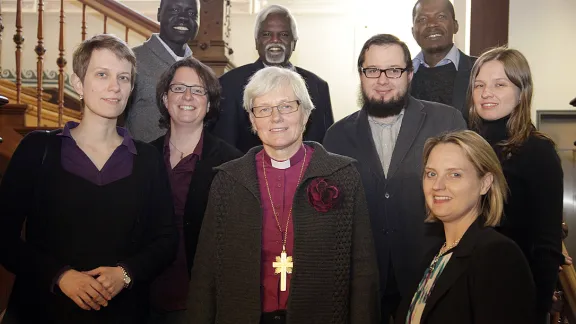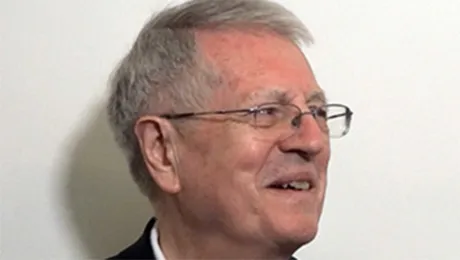
LWF member church representatives and staff at the first meeting of the LWF study group on Lutheran engagement in public space, in Stuttgart, Germany. Photo: Dr Thilo Fitzner
LWF Study Group Outlines Framework for Two-Year Process
STUTTGART, Germany/GENEVA, 6 February 2015 (LWI) – The group leading The Lutheran World Federation (LWF) in understanding why and how and its member churches are engaged in the public space has outlined common goals envisaged for the study process.
The seven-person team of theologians representing all the LWF regions and staff from the Department for Theology and Public Witness (DTPW) held their first meeting at the Protestant Academy Bad Boll in Germany, 29-31 January. They affirmed that the public space needs to offer a just place for equal participation of all citizens. It is part of the Christian baptismal vocation to constructively contribute to and help create space that allows people to negotiate and engage in transformative actions that build justice and peace in society.
The theologians noted, however, that there are dynamics that distort public space, like manipulation, fragmentation or domination. Christians and churches need to challenge and counter such practices.
In order to discern more clearly the role of churches and Christians in the public space, the study group discussed Lutheran dialectic distinctions such as the spiritual and worldly realm, being saints and sinners and the relationship between faith and reason. They also looked at Lutheran understanding of freedom and responsibility.
“How might we be a more prophetic Lutheran/Christian witness amidst the cacophony of religious voices in our public square? How might we, as Lutherans, contribute in partnership with others to building healthy societies where all of God’s children, and the fullness of creation, might flourish?” reflected group member Dr Kathryn M. Lohre, executive for ecumenical and interreligious relations in the Evangelical Lutheran Church in America.
For study group member Rev. Dr Eva Harasta, study secretary on theology and interreligious relations from the Evangelical Church of the Augsburg Confession in Austria, religious pluralism is an important factor in defining the scope of active engagement in public space. “Coming to terms with the multi-religious situation is fundamental and inter-contextuality is relevant for developing a hermeneutics of Lutheran engagement in the public sphere,” she said.
“The different members of the study group come to this process with different perspectives, but they all share the concern that we need to articulate more clearly our active contribution to public space as a just place for all, ” observed Rev. Dr Simone Sinn, LWF study secretary for Public Theology and Interreligious Relations .
Sinn noted that the social-political contexts in the different LWF regions are critical in ensuring that the study process resonates with today’s realities. “Those who are situated on the margins and those who are silenced challenge and question any easy understanding of public space, and push us to come to a deeper, even more engaged understanding of public space. The study group has just started an important process of reflection and action for the Lutheran communion as a whole,” she emphasized.
The study group is chaired by Church of Sweden Archbishop Dr Antje Jackelén. The outcome of its first meeting will be shared with the respective LWF regional church leadership conferences. Its second meeting will take place in the context of the October 2015 LWF theological conference on the Reformation in Windhoek, Namibia, to gather insights from other stakeholders. A first draft report will be presented to the LWF Council in 2016.
[At the Bad Boll meeting, the participants from Brazil, India and Poland shared insights from their respective contexts and their expectations from the study process. Read more on the LWF Blog.]


